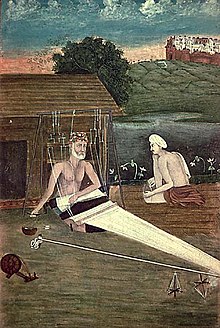
카비르(영어: Kabir, 힌두어: कबीर, 펀자브어: ਕਬੀਰ, 우루두어: کبير, 1440∼1518)는 인도의 철학자, 성자, 시인이다.
그러나 비슈누파의 수행자(修行者) 라마난다를 사사(師事)한 뒤부터 유일절대신(唯一絶對神)인 라마(Rama), 즉 범(梵)에 대한 신애(信愛)를 통한 해탈을 주장하였다.
그 설은 힌두교를 근간으로 하면서도 이슬람 교도에 대해서까지 똑같은 해탈을 주장하여 이슬람교·힌두교의 차이를 초월하는 것이 되었다.
예컨대 우상 숭배나 고행, 카스트를 부인하고 일신숭배 등의 이슬람교(특히 수피파)적인 영향을 많이 볼 수 있다.
예컨대 우상 숭배나 고행, 카스트를 부인하고 일신숭배 등의 이슬람교(특히 수피파)적인 영향을 많이 볼 수 있다.
카비르 자신이 방직공으로서의 세속적인 직업을 가졌으며, 더구나 힌디의 속어(俗語)로 설법했기 때문에 그 가르침은 널리 번져 이윽고 이슬람교의 시칸다르 로디왕(王)과 대립, 여러 나라를 방황한 끝에 죽었다.
그의 작품들은 박티 운동에 큰 영향을 주었다.
그의 작품들은 박티 운동에 큰 영향을 주었다.
===
Kabir Das (IAST: Kabīr; 1398/1440 — 1448/1518)[1] was a 15th-century Indian mystic poet and saint, whose writings influenced Hinduism's Bhakti movement and his verses are found in Sikhism's scripture Guru Granth Sahib.[2][3][4] His early life was in a Muslim family, but he was strongly influenced by his teacher, the Hindu bhakti leader Ramananda.[2] Kabir was born in the city of Varanasi, Uttar Pradesh.
- Kabir is known for being critical of both organized religion and religions. He questioned meaningless and unethical practices of all religions primarily the wrong practices in Hindu and Muslim religion.[2][5]
- During his lifetime, he was threatened by both Hindus and Muslims for his views.[6]:4
- When he died, both Hindus and Muslims he had inspired claimed him as theirs.[3]
- Kabir means Famous Poet/Saint
Kabir suggested that Truth is with the person who is on the path of righteousness, considered everything, living and non living, as divine, and who is passively detached from the affairs of the world.[3]
To know the Truth, suggested Kabir, drop the "I" or the ego.[6]:4
Kabir's legacy survives and continues through the Kabir panth ("Path of Kabir"), a religious community that recognises him as its founder and is one of the Sant Mat sects. Its members are known as Kabir panthis.[7]
